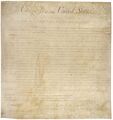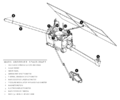September 25
1644: Astronomer and instrument maker Ole Rømer born. He will make the first quantitative measurements of the speed of light.
1777: Polymath Johann Heinrich Lambert dies. He made important contributions to mathematics, physics (particularly optics), philosophy, astronomy, and map projections.
1789: The United States Congress passes twelve amendments to the United States Constitution: The Congressional Apportionment Amendment (which was never ratified), the Congressional Compensation Amendment, and the ten that are known as the Bill of Rights.
1819: Mathematician and Anglican theologian George Salmon born. He will work in algebraic geometry for two decades, then devote the last forty years of his life to theology.
1893: Mathematician and statistician Harald Cramér born. He will help found probability theory as a branch of mathematics, writing in 1926: "The probability concept should be introduced by a purely mathematical definition, from which its fundamental properties and the classical theorems are deduced by purely mathematical operations."
1992: NASA launches the Mars Observer, a $511 million probe to Mars, in the first U.S. mission to the planet in 17 years. The probe will fail eleven months later.
2002: Steganographic analysis of Humpty Dumpty At Bat reveals previously unknown biography of Babe Ruth by Lewis Carroll.
2003: Journalist, writer, literary editor, and actor George Plimpton dies. Plimpton is famous for his "participatory journalism": competing in professional sporting events, playing with the New York Philharmonic Orchestra, performing a circus trapeze act, and then recording the experience from the point of view of an amateur.
2017: Dennis Paulson of Mars says that the twenty-fifth anniversary of the launch of the Mars Observer is a bittersweet event, because the spacecraft will be lost eleven months later.








